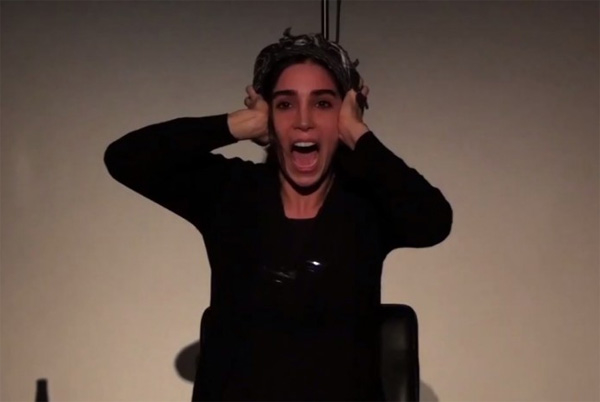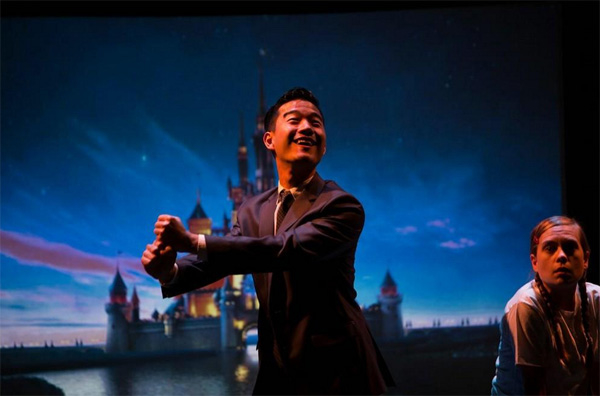FringeNYC 2014: Interview; Magic Kingdom; Mother's Day
This is TheaterMania’s third roundup of reviews from the 2014 New York International Fringe Festival.

by Zachary Stewart
Iranian playwright Mohammad Rahmanian presents two souls masticated by the horrors of the Algerian Revolution in Interview. The two-hander is now making its New York debut with a new English translation, following a run earlier this summer in Tehran.
The play takes the form of two interviews (read: interrogations). Blinding lights come up on Naim (Afshin Hashemi), an 18-year-old Algerian man who exhibits childlike behavior. He's accused of murdering a French girl named Monique. "That's the way revolution is: Anyone can be shot," he nonchalantly tells his questioner (Atefeh Nouri). But the revolution ended several years ago. The tables turn in the second scene, with Hashemi playing the interrogator and Nouri playing Saffier, a mentally shaken torture victim who is also accused of murder.
Hashemi (who starred in Hamlet, Prince of Grief at last year's Under the Radar Festival) also directs. The staging is incredibly minimal, with both actors seated, facing the audience for the entire performance. They never get up, save for during a blackout to switch roles. This means that it is entirely incumbent upon the actors to convey the story. For the most part, they succeed.
As the interviewer, Nouri is sympathetic but firm. This controlled stoicism stands in sharp contrast to her unhinged behavior in the second half. Hashemi allows the frustrations of the interviewer to bubble to the surface. As the squeaky-voiced Naim, he is both spritely and disturbing, laughing inappropriately at death and destruction. While his thick Tehrani accent makes him a bit harder to understand than Nouri, he makes up for it with a physically and vocally committed performance.
With heartbreaking detail, Rahmanian makes it clear that both of these characters are damaged, but in a saner time might have lived perfectly happy lives: They came of age in a time of revolution, when anarchic violence was virtuous. Once the new elite took control, there was a need to restore order. Interview compellingly contends that closing the Pandora's box of revolution is easier said than done, and might just be impossible.

(© Thanh Tran)
by Hayley Levitt
The line between fantasy and reality is heavily blurred at Disney World's fantastical Magic Kingdom as seen in Cory Conley's new comedy Magic Kingdom, now among the offerings at the 2014 New York International Fringe Festival. Conley returns to the festival for the first time since 2011 when his comedy, The More Loving One, received the award for Best Play of the Fringe season. In homage to real life (though to what degree of specificity we don't know), Conley stars in his own production as struggling playwright Cory who has been experiencing three years of writer’s block — an episode we learn was triggered by a romantic tryst gone awry with his much younger male writing student (depicted in a breathless Facebook rant by Cameron Michael Burns).
As he flounders in both love and career, an enigmatic voicemail message from his neurotic sister Claire (a convincingly frenetic Gina LeMoine), who is vacationing with her family in Disney World, inspires him to hop the next plane to Florida to get the dirt on her mysterious travel plans. What he finds is that an unfortunate turn of events at the Disney resorts has shifted her focus to making the Magic Kingdom's famous castle her permanent address. As she experiences what Cory perceives to be a mental break, he proudly takes on the messianic role of supportive uncle to his abnormally mature pre-teenage niece Emma (played by the shrewdly comic Marisa Lark Wallin).
Appealing to the unfortunate modern zeitgeist of lost souls and upspeak, Conley speaks in a tentative monotone — a comic device that is alternately wry and grating, but nevertheless expresses his character's paralyzing insecurity. Director Craig Baldwin, who reprises his partnership with Conley, reins in the quirky plot twists, harnessing the sincerity at the core of Conley's script. With little fourth wall to speak of, the piece often seems like a cathartic theatrical exorcism for the playwright to cleanse himself of his personal demons. As this impromptu Disney getaway leads Cory down an unconventional path of self-discovery, we're left with a slight aftertaste of self-indulgence but an overall admiration for its brutal honesty.

(© www.mothersdaytheplay.com)
by Zachary Stewart
Being gay just isn't quite the source of family drama it used to be (at least in the American Northeast). These days, one has to try a lot harder to scandalize one's parents.
Joey Pollack (Karl Gregory) is a gay man living in New York. He returns to his childhood home in New Jersey for Mother's Day, arriving in full drag as Helen Back (his night job). As Helen marches around in Louboutins throwing shade, his mother, Liz (Renee Claire Bergeron), politely sips wine while his father, Talbott (Neal Lerner) prepares dinner. They've seen this all before. Joey will have to step up his game if he's going to get a rise out of his thoroughly modern parents. Of course, he could always raise the issue of older brother Nicky (Brough Hansen) pushing 30 and still living in their basement. Then there's the little secret Joey's keeping in reserve, waiting for just the right time to share.
Playwright Colin Drucker reels us in with a laugh-out-loud comedy and then blindsides us with a family tragedy, tailor-made for the age of boomerang children. Drucker has a talent for witty repartee and this stellar ensemble (under the stalwart direction of Reginald L. Douglas) knows how to sell it. All of the relationships feel real and specific. We get to know (and even enjoy) this idiosyncratic clan with a penchant for verbal barbs tempered with a lot of love…or so it seems. Your eyes will be glued to the stage as you watch this delicate tapestry of a modern family unravel over the course of two hours.
Fans of living-room drama won't want to miss Mother's Day, which exudes a sophistication and nuance very rare for a first-time playwright. I can't wait to see what Drucker writes next.










